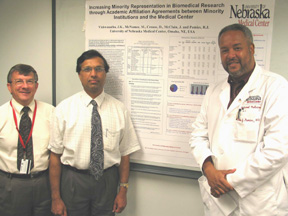 |
From left, David A. Crouse, Ph.D., Jamboor K.Vishwanatha, Ph.D., and Rubens J. Pamies, M.D. |
The poster, titled “Increasing Minority Representation in Biomedical Research through Academic Affiliation Agreements between Minority Institutions and the Medical Center,” was authored by Jamboor K.Vishwanatha, Ph.D., assistant dean for graduate studies and research and professor and vice chairman of the department of biochemistry and molecular biology; Mary McNamee, Ph.D., associate director of the Office of Student Equity and Multicultural Affairs; David A. Crouse, Ph.D., associate vice chancellor for academic affairs and professor of the department of genetics, cell biology and anatomy; John McClain, Ph.D., chief student affairs officer, Student Services administration; and Rubens J. Pamies, M.D., vice chancellor for academic affairs and dean for graduate studies.
Dr. Vishwanatha presented the poster at the meeting.
“UNMC has a strategic goal of becoming a culturally competent organization by recruiting, retaining and ensuring satisfaction of underrepresented minority students, faculty and staff, as well as expanding the emphasis on cultural competence in education,” Dr. Vishwanatha said. “We have made steady progress in providing biomedical research and educational opportunities for students from underrepresented groups.”
To achieve this goal, UNMC has entered into academic affiliation agreements with Dillard University (New Orleans, La.), Fort Lewis College (Durango, Colo.), and the University of Arkansas at Pine Bluff (Pine Bluff, Ark.). In addition, agreements are being worked out with Morehouse College and Spelman College (Atlanta, Ga.), Bennett College (Greensboro, N.C.), Virginia State University (Petersburg, Va.) and Tennessee State University (Memphis, Tenn.).
The academic affiliation agreement provides for student research opportunities during the summer; faculty exchanges for research; seminars and presentations; and collaborative grant applications and research. Students participating in summer research spend at least two summers at UNMC and are typically supported by NIH supplements, EPSCoR funding and MARC program stipends. Students participating in the program are strategically positioned for entry into one of the graduate studies programs at UNMC.
“In the past three years, we have provided research opportunities for 22 students from minority institutions,” Dr. McNamee said. “Although most of the participating students are still in their undergraduate programs, this initiative has already resulted in three applications to our graduate research and professional programs from students graduating from these institutions.”
The GREAT Group provides professional development to and fosters the exchange of information and ideas among the faculty and administrative leaders of biomedical Ph.D. and postdoctoral programs. The GREAT group members evaluate policy developments that affect the recruitment and retention of new scientific talent and provide direction on these issues.
There are 25 minority students in summer research internships at UNMC this summer. These students are from such institutions as the University of Nebraska-Lincoln, Dillard University, Virginia State University, Stanford University, St. Mary’s University and Omaha’s Mercy High School.